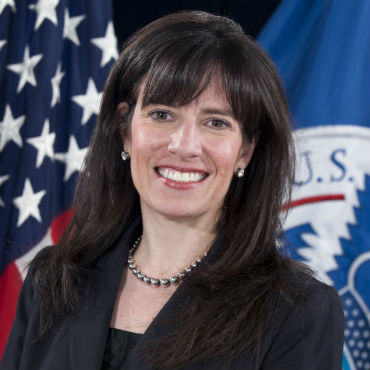DHS cyber official: Einstein key to the future of big data at agencies
The latest version of the Einstein intrusion and detection system would not have saved OPM from a massive hack. But Phyllis Schneck, the Department of Homeland Security's top cybersecurity official, told FCW she still has big plans for the multibillion-dollar program.

Phyllis Schneck is DHS' deputy under secretary for cybersecurity and communications in the National Protection and Programs Directorate.
Even if the Office of Personnel Management had the latest version of the Department of Homeland Security's multibillion-dollar firewall in place last year, it still would not have prevented the massive hack of OPM that compromised the data of some 22 million Americans. Phyllis Schneck, DHS' top cybersecurity official, readily admits this.
Nonetheless, Schneck sees Einstein, an intrusion detection and prevention system for civilian agencies that is administered by DHS, as a foundational platform for a more sophisticated, data-driven cyber defense.
In the coming months, the deputy undersecretary for cybersecurity and communications said, officials will pair Einstein 3A, the latest version of the firewall, with cyber intelligence to more quickly detect and thwart hackers like the OPM intruders. In other words, Schneck wants to use a signature-based system to do more than block threat signatures.
DHS is currently piloting a "reputation scoring" system that works with Einstein to add more analytical color to adversaries' trademark cyber signatures. The pilot uses cyberthreat information from both the intelligence community and the private sector to flesh out a "credit score" of a cyber adversary, said Schneck, once an executive at cybersecurity vendor McAfee.
The reputation scoring system is "a subset of a larger direction we're going in data analytics," Schneck told FCW in a recent interview in her Arlington, Va., office.
Einstein, whose projected lifecycle cost is $5.7 billion through fiscal 2018, according to the Government Accountability Office, came under fire in the aftermath of the OPM breach last summer. Hackers were in OPM networks for 10 months before their malware signatures were plugged into Einstein, according to a DHS timeline of the hack obtained by FCW.
At the time of the breach, OPM had the first and second versions of Einstein deployed, according to DHS. These systems provide only threat detection and not blocking. OPM has since deployed Einstein 3A.
A public-private emissary
A recently published GAO study offered further fodder for Einstein's critics.
The report found that Einstein provides a "limited ability to detect potentially malicious activity entering and exiting computer networks at federal agencies." Moreover, the program "does not monitor several types of network traffic, and its 'signatures' do not address threats that exploit many common security vulnerabilities and thus may be less effective."
Schneck was eager to respond to the GAO report, which she described as well intentioned but based on dated information. Any suggestion that Einstein wouldn't pass muster in the private sector is misguided, she added.
"Einstein should never be compared to a commercial [intrusion detection and prevention] system," Schneck said. "It's like taking an apple and saying, 'Are you an orange? Did I peel you right?' It's not applicable."
Einstein picks up some threats a commercial firewall might miss and vice versa, she added. "One system, one set of eyes watching the entire set of civilian agencies is invaluable," Schneck said in defending Einstein.
Schneck left her post as McAfee's CTO for global public sector to join DHS in 2013. Since then, she said, she has used her private-sector experience to remind DHS colleagues about what works and what doesn't when liaising with industry.
"I inject myself a lot and say, 'No company would ever want to hear that,'" she said of her conversations with government colleagues.
DHS' work with the private sector is manifold -- from exchanging cyberthreat information to scouting emerging technologies.
One thing Schneck said hangs over her when she thinks about improving DHS' work with companies is "how hard it is…for a global American company to do business overseas if it's perceived that they're too tight with the U.S. government. So that hurts you in the information sharing at a time when it's most urgent to do the information sharing."





